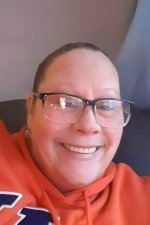Seeding a Legacy of Healing
Helping exploited women build healing relationships

Having experienced sexual trauma as a child — an experience that was never addressed — Ann Marie (pictured left) was already at a disadvantage, already in pain, as she entered adulthood. So when a friend offered her crack, she accepted. The chemical escape was a welcome reprieve, and she craved more. To pay for it, Ann Marie sold the only thing she had of any value: herself. And that’s how the cycle began: addiction, desperation, prostitution, jail.
“Each time, I was let out of jail to go back and do what I do,” she says. In all, Ann Marie was arrested almost 50 times for prostituting until she finally found someone who cared — a public defender who offered her a way out, a way to Dawn’s Place.
By Annette Mikat

Dawn’s Place is a safe, supportive 12-month residential program for women who have been trafficked, prostituted or pimped — all of which are forms of modern-day slavery. Referrals come from relationships with courts, social services programs, the FBI and Homeland Security. The program offers survivors counseling and trauma-informed therapy, skills development, education and, most importantly, a place to heal, find purpose and experience healthy relationships.
To date, Dawn’s Place has housed more than 110 women exiting commercial sexual exploitation, known as CSE, dwarfs available recovery programs. The U.S. State Department reports between 14,500 and 17,500 people are trafficked in the U.S. alone each year. But Dawn’s Place, with its eight beds, is the only residential program in all of Philadelphia for women escaping CSE, meaning there’s approximately one program placement for every 70 victims in need.
Similarly, when it opens later this year, Bakhita Mountain Home, based in Colorado Springs, will be Colorado’s only program dedicated solely to helping adult women escaping CSE. Named after Saint Josephine Bakhita, the patron saint of human trafficking survivors, the home will offer a 24-month program that can accommodate five women.
The challenge for these programs is primarily financial. Residential programs for CSE survivors require significant financial backing to provide needed 24/7 staffing and qualified counselors, not to mention the homes and upkeep and basic programming and living expenses.
“The government likes to fund large facilities to help people escaping human trafficking,” says Sister of St. Joseph Kathleen Coll, executive director of Dawn’s Place. “Consequently, small facilities like Dawn’s Place must rely on grants, private donations and fundraising events.”
FSPA understands ending modern-day slavery will require a multi-pronged approach, including educating, reporting and advocacy along with healing its victims. That’s why the congregation was quick to approve Seeding A Legacy of Healing grants for the organizations. The support will seed an endowment for sustainability and expand transitional housing for Dawn’s Place, adding two bedrooms to its transitional housing unit, and help cover Bakhita Mountain Home operational costs.
Franciscan Sisters of Perpetual Adoration Marie DesJarlais, Mildred Tigges, Marian Massman, Shirley Morrissey, Cecilia Corcoran, Marlene Weisenbeck and Fran Ferder sponsored the $350,000 grant for Dawn’s Place. When in Philadelphia, Sister Marie has advocated for the program and secured ministry grants to help with client transportation costs for several years. She became aware of human trafficking abuses while ministering in Central America in the 1990s and saw the horrific effects.
Sisters Joanne Moeller, Donna Stevens, Romana Klaubauf and Suzanne Rubenbauer sponsored the Bakhita Mountain Home grant of $50,000. The grant grew from Sister Joanne’s relationships with Sisters of St. Francis of Perpetual Adoration of Colorado Springs, who, with Benedictine sisters, founded the program. After attending educational seminars, Sister Joanne began volunteering with Bakhita and serves on the development and communications committees.
As for Ann Marie, now a 10-year graduate of Dawn’s Place, she is whole again. She has restored healthy relationships with her three daughters — and now a grandchild, too — and, equally important, she has found purpose in helping other survivors through her work as residential coordinator at Dawn’s Place.
With the myriad of people Ann Marie has encountered so far in life, she can attest to the power of relationships. They can isolate, ravage self-worth and destroy hope. They can also affirm, build confidence and restore dignity. As for Ann Marie, she says, “I choose the latter.” So does FSPA.
Seeding a Legacy of Healing reflects FSPA ministries
Franciscan Sisters of Perpetual Adoration created the Seeding a Legacy of Healing initiative after transferring oversight of Mayo Clinic Health System – Franciscan Healthcare to Mayo Clinic in 2017. The transfer allowed FSPA to move deeper into their calling to address humankind's evolving needs, and sisters are now investing proceeds into collaborations that address those priorities.
Each Seeding a Legacy of Healing grant originated with a group of sisters who have a relationship with the recipient organization. In the first round, 23 nonprofits received funding, all reflecting the sisters' diversity, vision and passion. Another round will follow later this year.
